Monday is Halloween, and while much of the world will be busy getting spooked by zombies and ghouls, we at Seattle Weekly have some frights a little closer to home.
FDR be damned, here are some issues that for us define fear itself:
We fear that despite the best intentions, infighting among people and groups who care about climate change will be the death knell to any efforts to effectively combat it. We also fear that even if these groups got along and did everything in their power to launch the most effective climate-policy campaign this planet has ever known, the shortsighted economic forces that got us into this mess to begin with would prevent any real change.
We fear that our vote really doesn’t count and never will because of a two-party system that has our whole country stuck in an ineffectual, centrist gridlock that never even remotely chips away at the clear and present issues facing our society—among them a military gone wild, a health-care system still broken for all but the wealthy, and the aforementioned climate apocalypse. As such, we fear that when “a demagogue, a xenophobe, a sexist, a know-nothing, and a liar” runs for office, peddling racism and hatred, defending rape as “locker-room talk,” and spewing complete and utter nonsense, pundits will always still call it a “debate.”
We fear many men this weekend will dress up as “bad hombres,” and that in doing so will commit egregious cultural appropriation.
We fear that there is no viable solution to homelessness in Seattle—that the most humanitarian measures will in fact only attract a greater homeless population in search of the collective kindness and support unique to our city, and that even as we successfully house our current homeless population, another will replace it as other cities adopt more draconian measures for addressing the crisis and drive out their own unhoused, turning us into a kind of refugee camp for capitalism’s losers. We do not believe that this is a reason to not do the right thing; we should be always guided by a moral sense when determining the way our city will treat its most vulnerable citizens. And we actually do not object to becoming a kind of rehabilitation center for those among us with the least. Our true fear is that this influx of more homeless over a longer period will result in Seattle’s turning its back on this population in need—that we will become as cruel as other cities in a never-ending race to the bottom of civility and empathy.
We fear that underground creative culture is bound for extinction in Seattle, and that we are beyond the point of no return. Numerous artists quietly move away every month to locales that are either more affordable or provide greater opportunity for commercial work. We fear that without these quality artists to fill our venues, and with rental prices as high as they are, that the small businesses built around this culture will close and we will be left only with large legacy venues hosting touring artists and shows, playing to audiences who are less adventurous and open to work that might challenge them. We fear that where small galleries, theaters, and clubs once stood, there will be only brewpubs and restaurants.
We fear that, out of deference to developers and capitalism, we will allow the fabric of Seattle to get bulldozed for an endless stream of new apartment buildings without stopping to ask if there’s another way. We fear this fear will get us labeled NIMBYs, even though all we really care about is saving dive bars.
We fear we’ll die flipping our bikes on the streetcar tracks on Jackson, becoming another human sacrifice to a transit system too often guided by political expediency rather than what makes sense. We fear a future in which we tell ourselves that mass transit can be achieved on the cheap simply by expanding systems like RapidRide, when in fact a region-wide rail system is the clear answer.
We fear the megaquake will hit soon, while Washington’s preparedness remains, according to the conclusion of a state report first uncovered by The Seattle Times, “grossly inadequate.”
We don’t fear a Hillary Clinton presidency. We do fear Macklemore will feel compelled to write her a congratulatory song. We fear we will have to listen to this song. We fear this song will be bad.
editorial@seattleweekly.com





